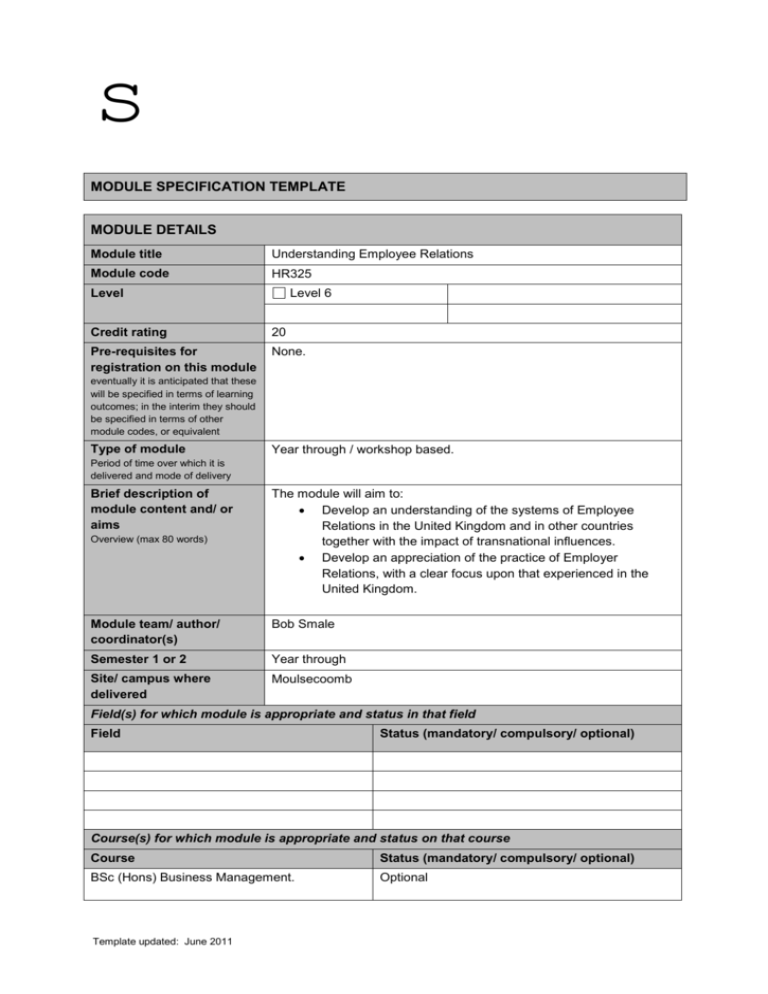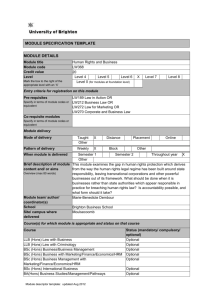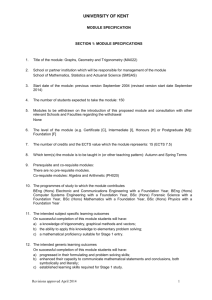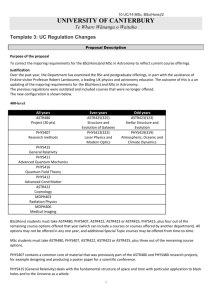Understanding Employee Relations
advertisement

s MODULE SPECIFICATION TEMPLATE MODULE DETAILS Module title Understanding Employee Relations Module code HR325 Level Level 6 Credit rating 20 Pre-requisites for registration on this module None. eventually it is anticipated that these will be specified in terms of learning outcomes; in the interim they should be specified in terms of other module codes, or equivalent Type of module Year through / workshop based. Period of time over which it is delivered and mode of delivery Brief description of module content and/ or aims Overview (max 80 words) The module will aim to: Develop an understanding of the systems of Employee Relations in the United Kingdom and in other countries together with the impact of transnational influences. Develop an appreciation of the practice of Employer Relations, with a clear focus upon that experienced in the United Kingdom. Module team/ author/ coordinator(s) Bob Smale Semester 1 or 2 Year through Site/ campus where delivered Moulsecoomb Field(s) for which module is appropriate and status in that field Field Status (mandatory/ compulsory/ optional) Course(s) for which module is appropriate and status on that course Course Status (mandatory/ compulsory/ optional) BSc (Hons) Business Management. Optional Template updated: June 2011 BSc (Hons) Business with Marketing. Optional BSc (Hons) Business with Human Resource Management. Option. BSc (Hons) International Business with Language BSc (Hons) Marketing Management Option. LLB (Hons) Law with Business Option. BSc (Hons) Accounting and Finance Option. BSc (Hons) Finance and Investment Option. MODULE AIMS, ASSESSMENT AND SUPPORT Aims The module is designed to: o Provide a general introduction to the development of Employee Relations in the United Kingdom and to compare and contrast the Employee Relations systems operating in United Kingdom with a range of other countries together with the impact of transnational influences. o Develop knowledge and understanding the practical and procedural aspects of Employee Relations, including: union recognition, grievance and discipline, employment tribunals, collective bargaining, conflict resolution and consultation. o Explore the nature and expression of conflict in the employment relationship together with methods used for conflict resolution and for the accommodation of employee interests and the generation of employee commitment. Learning outcomes/ objectives On completion of this module the students should be able to demonstrate an appreciation of: Template updated: June 2011 Theoretical approaches to the understanding of Employee Relations including the unitary and pluralistic approaches. The application of theoretical approaches to the Employee Relations systems operating in the United Kingdom and another country. The perspectives and objectives of the various parties to the employment relationship. The development of Employee Relations in United Kingdom. The experience of Employee Relations in another country including the impact of transnational influences upon local systems. The recognition decision, de-recognition and the role of trade union avoidance and containment strategies. Methods of accommodating employee interests including participation and involvement techniques and employee voice. The nature and importance of Employee Relations procedures and in particular the handling of employee grievances and disciplinary cases, together with the process of application to, and the conduct of employment tribunals. The requirements for successful preparation for, and conduct of, collective bargaining. The significance of conflict in Employee Relations together with methods of conflict resolution with particular reference to arbitration, conciliation and mediation. Cognitive - on completion of the module the student should be able to: Content Demonstrate critical thinking and analysis. Identify assumptions and evaluate statements. Identify implicit values. Define terms correctly. Generalise appropriately. Semester 1 – The Development of Employee Relations: Introduction to Employee Relations. Theoretical approaches to the study of Employee Relations. The study of Comparative Employee Relations and the impact of transnational influences upon national systems. The development of Employee Relations in the United Kingdom. Institutions in Employee Relations. The development of trade unions in the United Kingdom. Accommodating employee interests: participation, involvement and employee voice. Student country presentations. Support session for assignment completion. Semester 2 – The Practice of Employee Relations: Trade union recognition, the recognition decision, derecognition, trade union avoidance and containment strategies. Dealing with grievances. Dealing with discipline. Employment Tribunals. Collective bargaining policies, procedure & practice Preparing for collective bargaining. Collective bargaining role play. Collective bargaining outcomes, the role of conflict in Employee Relations and dispute resolution. Current and future trends in Employee Relations. Support session for assignment completion. Teaching and learning strategy The module will be delivered through a series of workshops. Allocation of study hours to activities (including pre-module activities, contact time, private study time and assessment) Semester 1: Weekly workshops will initially be tutor led and will focus upon the main themes of the module. A programme of student led ‘Country Presentation’ workshops will be negotiated with students during the first half of the semester for delivery in the later stages, with students being required to prepare and deliver group presentations for assessment on particular countries of their choice. Semester 2: Template updated: June 2011 Weekly workshops will mostly be tutor led, but students will also work on a case study which will be both the subject of a role play negotiation activity and also of their second course work assignment. The case study will focus upon a dispute and students will be encouraged to prepare a case which shows a full appreciation of both sides of the argument together with methods of conflict resolution and alternative strategies which the parties might be adopt in the future in order to create better Employee Relations. Lectures: Seminars: Workshops: 0 0 40 Open Learning: Self Study: Assessment: 0 160 00 Total: Learning support Including indicative reading, computer packages, field trips etc. 200 hours Workshop programme This will comprise twenty two-hour workshop sessions, as follows: Tutor led workshops 14 Student country presentation seminars 3 Collective bargaining role play 1 Assignment support sessions 2 Indicative Reading (the latest editions of): Bamber, G. Lansbury, R. & Wailes, N. International and Comparative Employment Relations. London: Sage. Blyton, P. & Turnbull, P. The Dynamics of Employee Relations, Basingstoke: Palgrave. Burchill, F. Labour Relations, Basingstoke; Palgrave. Dundon, T. & Rollinson, D. Understanding Employee Relations. Maidenhead: McGraw-Hill. Gennard, J. & Judge, G. Managing Employee Relations, London: CIPD Katz, H. C. & Darbishire, O. Converging Divergences: Worldwide Changes in Employment Systems, ILR (Cornell University) Press. Morley, M. J. P. Gunnigle, P. & Collings, D.G. Global Industrial Relations, Abingdon: Routledge, Pilbeam, S. & Corbridge, M. People Resourcing & Talent Planning. Harlow: Pearson. Rose E, Employment Relations, Harlow: Pearson. Williams, S. & Adam-Smith, D. Contemporary Employee Relations: A Critical Introduction. Oxford: Oxford University Press. Assessment tasks Including weighting of individual tasks Semester 1 (50%): Presentation –group presentation (up to four students) on chosen country (15-20 minutes /15%). Comparative Report - individual report comparing United Kingdom with chosen country (2,500 words / 35%). Semester 2 (50%): Template updated: June 2011 Briefing Paper - reflecting group preparation for collective bargaining meeting (500 words / 15%) Research Report - reviewing the case study company’s Employee Relations procedures and practices (2,500 words / 35%) EXAMINATION INFORMATION Area examination board External examiners Name Date appointed Beryl Badger QUALITY ASSURANCE Date of first approval Only complete where this is not the first version Date of last revision Only complete where this is not the first version Date of approval for this version Version number 1 Modules replaced HR313 & HR314. Specify codes of modules for which this is a replacement Template updated: June 2011
![Labor Management Relations [Opens in New Window]](http://s3.studylib.net/store/data/006750373_1-d299a6861c58d67d0e98709a44e4f857-300x300.png)





